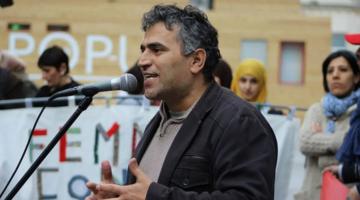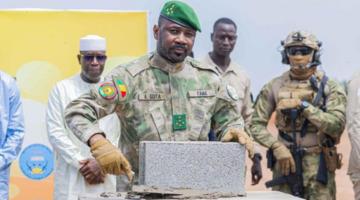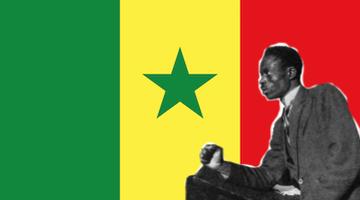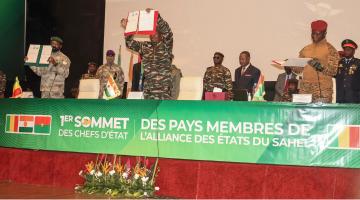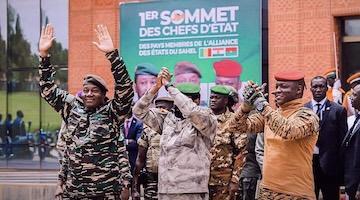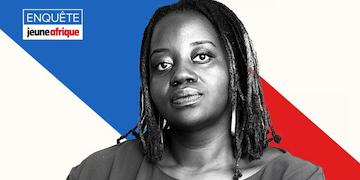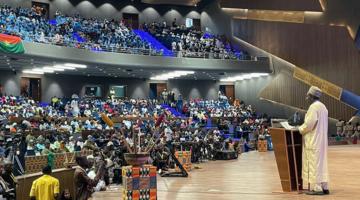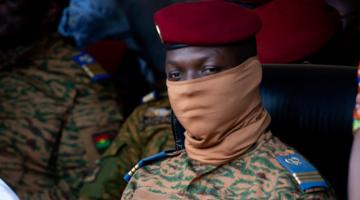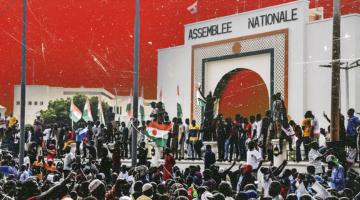The French presence in Africa continues. Even as its troops leave Mali, they head to Niger. The US and its EU/NATO allies should leave all of Africa alone.
This article was originally published in Newsclick.
On February 17, 2022, French President Emmanuel Macron held a press conference in Paris just ahead of the sixth European Union-African Union summit in Brussels along with Senegal’s President Macky Sall and Ghana’s President Nana Akufo-Addo as well as European Council President Charles Michel. At the conference, Macron announced that the French forces would be withdrawing from Mali. This means that France and its European allies will start to wind down “Barkhane and Takuba anti-jihadist operations in Mali.” The protests in Mali against the presence of the French troops seem to have finally succeeded.
Macron said that France had to withdraw its troops because it would no longer like to “remain militarily engaged alongside de facto authorities whose strategy or hidden objectives we do not share.” A statement appeared on the French government website signed by the European Union (EU) and by the African Union (AU) that made the same point, namely that “the Malian transitional authorities have not honored their commitments.”
The language used by Macron and included in the AU and EU statement shows a lack of transparency about the real reasons behind the withdrawal of troops from Mali. The government of Mali (“de facto” and “transitional”) came to power through two coups d’état in recent years: Colonel Assimi Goïta, leader of the National Committee for the Salvation of the People of Mali, carried out the first coup in August 2020 against the elected government and installed Bah Ndaw, who was a military officer, as the interim president of Mali. Ndaw was then overthrown in a second coup in May 2021, when Goïta took over the position of interim president himself. By June, the European countries insisted that the new military junta hold elections by February 2022. Goïta said that he would honor this timeline. He did not do so, which gave the EU and the AU the excuse to break links with Goïta’s government.
That’s the excuse being used by these regional powers to wind down operations in Mali. Matters become far less clear, however, when it comes to the statements that were made by France in this regard. Macron spoke about Goïta’s “hidden objectives,” but did not elaborate on that accusation. What could these “hidden objectives” be?
Mali’s Troubles
Mali’s troubles do not start and finish with the unrest in northern Mali nor with the military coup. If you were to ask Alpha Oumar Konaré, the president of Mali from 1992 to 2002, he would tell you a different story. When Konaré took over the presidency in Mali in 1992, the people were exhausted by the debt crisis produced by International Monetary Fund (IMF) policies and by military rule. They wanted something more. One of Konaré’s close advisers said during his time in office, “We service our country’s debt on time every month, never missing a penny, and all the time the people are getting poorer and poorer.”
Konaré’s government asked for relief from the IMF so that it could marshal resources toward ensuring the development of the northern part of the country; the insurgency, Konaré argued, would be better confronted by development than by war. The United States government and the IMF disagreed.
From Konaré’s time in office as president to now, Mali’s governments—whether civilian or military—have been unable to craft a policy framework to tackle endemic social and economic crises. It is true that there has been a long-standing rebellion in the north that has brought together the Ifoghas aristocrats among the Tuaregs and the Al Qaeda factions that came out of the Algerian civil war (1991-2002) and the destruction of Libya (2011-2012); none of the many peace agreements have worked largely because there is simply no money in Bamako, the capital of Mali, to promise the kind of development needed to undercut a million frustrations. Less remarked, but equally true, are the devastatingly poor social indicators in the rest of Mali, where hunger and illiteracy appear normal in Bamako’s bidonvilles.
Western intervention in much of Africa has not resulted in beneficial economic assistance in the region. This assistance has come through IMF austerity policies and military aid.
France’s 2013 military intervention into Mali came alongside its construction of a military project across the Sahel belt called G5 Sahel (including Burkina Faso, Chad, Mali, Mauritania and Niger) in 2014. The military in each of these countries received aid, and its officers received training. It is no surprise that Goïta, for instance, received training from the U.S. armed forces in Burkina Faso alongside Colonel Mamady Doumbouya, who carried out a coup in Guinea in September 2021; it is no surprise either that Lieutenant Colonel Paul-Henri Sandaogo Damiba of Burkina Faso trained alongside these men and carried out his coup in Burkina Faso in January 2022; and no surprise that in Chad, “General Kaka” (Mahamat Idriss Déby Itno), the son of the former president, was installed as the president by the military in what was effectively a coup in April 2021. Three of the G5 Sahel countries—Burkina Faso, Chad and Mali—are now led by a military government (Niger’s authorities thwarted a coup in March 2021).
All the handwringing about why there are so many coup attempts in Africa these days fails to connect the dots: no agenda out of the IMF-austerity model is permitted by the Western states, which prefer to build up the military forces in the region rather than allow a genuine social democratic process to open in these key African countries.
Discomfort With the Western Interventions
In October 2021, Mali’s current Prime Minister Choguel Kokalla Maïga told a Russian news outlet that his government had “proof” that the French are training terrorist groups such as Ansar Dine. According to his interview, France had created an “enclave” in the Kidal region in 2013. “They have militant groups there, which were trained by French officers,” Maïga said. Kidal is in Mali’s north, not far from its borders with Algeria and Niger.
Nothing Maïga said should have raised an eyebrow. France’s former ambassador to Mali, Nicolas Normand, made some similar comments in 2019 when he released his book on the continent, Le grand livre de l’Afrique. Normand told Radio France Internationale that Macron’s government forged ties with the National Movement for the Liberation of Azawad and with the aristocrats of the Ifoghas region to prevent them from making a rapid advance toward Bamako. France wanted to play the “good armed groups” against the “bad armed groups,” but in the end failed to see that both these groups were terrible for Mali. This approach, combined with the civilian casualties of the French military operations (22 civilians died when France bombed a wedding in Bounti in 2021, for example), turned the people of Mali away from France.
French troops have now begun to leave Mali, but they are not returning to France. They will be deployed to next-door Niger, where they will continue their mission to prevent migration to Europe and to fight off the radicalized victims of IMF austerity (which often come in the form of frustrated young people, some of whom turn to terror). Macron’s eyes are on the French presidential elections, which are expected to take place in April this year, and on the rising tensions in response to Russia’s military intervention into Ukraine.
Meanwhile, the people of Mali came to the streets to celebrate the departure of the French. Interestingly, many of the signs thanked the Russians. Perhaps the entry of Russian aid and mercenaries are the “hidden objectives” Macron was referring to?
This article was produced by Globetrotter. Vijay Prashad is an Indian historian, editor and journalist. He is a writing fellow and chief correspondent at Globetrotter. He is the chief editor of LeftWord Books and the director of Tricontinental: Institute for Social Research. He is a senior non-resident fellow at Chongyang Institute for Financial Studies, Renmin University of China. He has written more than 20 books, including The Darker Nations and The Poorer Nations. His latest book is Washington Bullets, with an introduction by Evo Morales Ayma.

